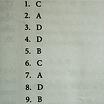
My sister, who is studying for the GRE in New York asked me recently if I had any tips. Conveniently, I tutor the GRE in Boston and I’ve tutored it for around 10 years. This is a quick reference guide for studying for the GRE, whether you have a tutor or not.
-
Start studying vocabulary early, very early.
2. Take a diagnostic.
With a test as broad as the GRE, it’s important to get a sense of where you need to focus so that you can develop a syllabus, a battle plan for how you are going to approach the test. Here’s a sample syllabus that one of our GRE tutors in Boston recently developed for a student working with Cambridge Coaching. Additionally, taking a practice GRE will also give you a sense of how long the exam is: expect to the test to last 4 hours.
3. Familiarize yourself with the GRE interface.
The new format of the exam is a little different. Notably, you are allowed to skip around to other questions with a section. You also maintain a “review list” to track which questions you answered and which ones you haven’t. We recommend that you answer questions you can answer immediately, when you run into a tough question, try to narrow your choices and take an educated guess and “mark” the question (you can “mark” three”). Obviously return to the marked questions if you can, but now you’ve made sure to answer everything even if you don’t have time. Finally, you should get used to the odd four-function calculator. When you study for the test, try to use a similar calculator so that acclimate yourself to the actual GRE.
4. The GRE essay should be clear, structured, and long.
Familiarize yourself with the two kinds of essays: analyze an issue and analyze and argument. You can find examples on the GRE website: http://www.ets.org/gre/revised_general/prepare/analytical_writing/issue/pool. For analyze an issue essays, which are always wishy washy premises that make no clear argument, you simply need to pick an argument and make it crisply, without nuance. The GRE is not about subtlety, it is about clarity and strong topic sentences, paragraph that advance a discrete piece of the argument, and a tidy conclusion. Try to be crisp while also writing as much as you can in the time involved (there are studies that suggest that length correlates to score). For the analyze an argument essay, you just need to evaluate the logic of the prompt. Do not make an argument, simply assess the premises, assumptions and conclusion. Again, structure and length are key.
5. Reading comprehension.
A few tips here. Don’t memorize the content, memorize the structure of the passage. Think about the passage as if it were a machine. How is it built? Which paragraph does what? The key here is to remember where the items are so that you can return to them. You always should go back. Second, pay attention to the first sentence of each paragraph (the topic sentence). This sentence tells you what the paragraph is about, and it usually flags the relationship of the paragraph to the previous one (the logic of the flow). Taking notes on the structure of the passage can be useful too.
6. Text completion.
For text completions, try not to jump to the answer choices. Instead, think of the words that you think would make sense. Then look for those choices. If you jump to the answers immediately, it’s easily to get lost in the slew of possibilities presented.
7. Sentence equivalence.
Same as above, but these have a flaw you can exploit. Because the test writer needs to provide one answer that is “almost correct,” you can look for the “twins,” the two answer choices that are alike. Often there will be multiple sets of twins, some of which will be obviously incorrect. If you can identify the two words that are “most right,” you’ll already have a 50/50 chance of getting the answer correct.
8. Read a book.
This sounds trite, but the people who do well on the GRE are readers, people who can concentrate, take in a high volume of information and make sense of it, and do it for a long time. Try to read a book that also supplements vocabulary at the same time. I like Louis Menand’s The Metaphysical Club, though it’s probably a bit better written than the dross on the GRE.
9. Reading comprehension.
Here’s a good one. For questions, that ask you to identify the main point of a passage or the author’s primary purpose, read the first word of each answer choice. Usually you’ll be able to eliminate answers immediately based on that word alone. Standard words that appear first – “explain,” “argue,” “describe,” etc. – are often quite different and obviate the need for reading further. Usually you can eliminate 3 answer choices with this technique alone.
10. The GRE verbal section is still about vocabulary.
Yes, I know I mentioned this one, but you need to be addicted to vocabulary. Memorize words every day, review the words you haven’t nailed down every day. Use them in context with your friends even if it makes you seem supercilious. It will be painful at first, but there are techniques that we teach that will allow you to learn as many as 30 new words in an hour. Even if you don’t use a GRE tutor, push yourself to learn as many words as you can and spend 30 minute to an hour on your vocab.

Comments